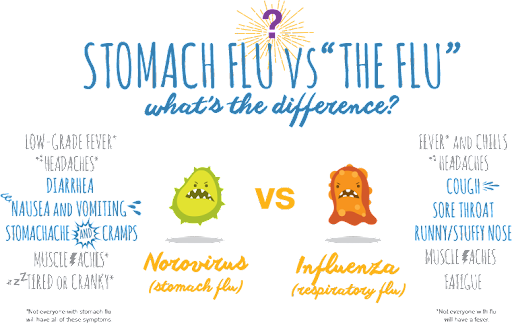
The stomach flu, also known as viral gastroenteritis, is a common illness that affects the stomach and intestines. It is typically caused by a viral infection, such as norovirus or rotavirus. Symptoms of the stomach flu include nausea, vomiting, diarrhea, stomach cramps, and sometimes fever. It can spread easily through contaminated food, water, or close contact with an infected person. The best option when it comes to getting better would be to get rest and drink plenty of fluids.
This virus has made its way to the United States. Cases and outbreaks of this virus started to rise in early 2023. Experts have a strong prediction that the virus will spread as winter makes its way. Although this virus is called a flu, it is not related to the flu which is caused by influenza viruses. Norovirus is similar to the flu because it is a very common and highly contagious viral infection that sickens millions of Americans every year. Annually, norovirus causes 19 to 21 million cases of vomiting and diarrhea in the U.S., 465,000 emergency room visits, 109,000 hospitalizations, and 900 deaths, per the CDC. After a lull during the COVID-19 pandemic, outbreaks of the stomach bug spiked this past winter, and norovirus activity remained high throughout the spring of 2023.
When it comes to preventing the stomach flu, you can follow hand-hygiene guidelines, and carefully wash your hands with soap and water after contact with patients with norovirus infection. When in contact with, or caring for patients who are symptomatic with norovirus, you can use gloves. You can also routinely clean and disinfect high-touch patient surfaces and equipment with an Environmental Protection Agency-approved product with a label claim for norovirus. In a healthcare facility, patients with suspected norovirus may be placed in private rooms or shared rooms with other patients with the same infection. If someone has this virus, it also may be best to call in for work to prevent any further contamination.
The stomach flu also doesn’t require any medication. It gets better on its own. It usually lasts between 1-3 days long. Although norovirus can spread year-round, it has a wintertime seasonality in the U.S., said Grusich, so cases tend to peak during the colder months. While other intestinal viruses are most common in the summer, norovirus is known as the “winter vomiting disease,” Dr. William Schaffner, professor of infectious diseases at Vanderbilt University Medical Center, tells TODAY.com. A couple of people who have gotten the stomach flu have given their thoughts on their experience. Cheryl Klein had said, “It’s definitely not a fun thing to go through, but it only lasted me a day.” Katya Way had said she “doesn’t want to go through that any time soon.”






